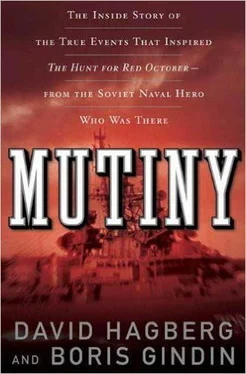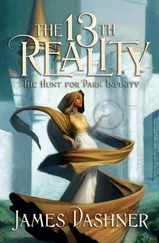“Anyway, if you want to do something like that, why not do away with the old man and take the ship?” the midshipman may have said. “Most of the crew would be with you, sir.”
Christian ran the idea past a few of the crewmen, who agreed. That early morning of April 28, 1789, Christian broke into the arms chest, distributed the weapons to his supporters, and arrested Bligh.
The captain, still in his nightshirt, was brought up on deck, and the assembled crew was asked who wanted to get off the ship with Bligh. Thirty of them raised their hands, and Bligh pleaded that he had a wife and four children and asked for some kind of mercy.
“It’s too late for that,” Christian told the captain. “You have forced us through hell these past weeks, and now there’s no turning back.”
Some of the men who wanted to go with Bligh were forced to stay behind, because there was no room for them aboard the captain’s gig. So Bligh and eighteen of his crew were set adrift with enough food and water for only five days.
Sablin knew the story, of course, and the next parts must have given him some pause. Captain Bligh made it back to civilization after a forty-eight-day voyage in which he had to ration the food and battle storms, losing only one man when they tried to come ashore for provisions on an island filled with cannibals.
For that tremendous feat of seamanship Bligh was court-martialed, acquitted, promoted to captain, and given command of HMS Providence, plus an escort vessel, Assistant, and was sent back to Tahiti for more breadfruit. This time without trouble.
Bligh, on the one hand, wrote a couple of successful books about the Bounty mutiny and then was involved in two other mutinies, including one while he was governor of New South Wales in Australia in 1805. Bligh died in 1817, with the rank of Vice-Admiral of the Blue, a well-decorated hero.
The mutineer Christian, on the other hand, wasn’t so lucky. He conned the Bounty back to Tahiti, where they picked up the Tahitian women and a few Tahitian men, and eventually they made their way to the remote island of Pitcairn, where he burned the ship to the waterline to prevent anyone from escaping and reporting their whereabouts.
The Polynesian men and the white crew were unhappy almost from the start. And within less than three years five of the original Bounty crew, including Fletcher Christian, and all the Polynesian men, were murdered.
Then, one by one, the Tahitian women killed all but two of the original mutineers, leaving only John Adams and Ned Young. Young died of natural causes in 1800.
The officers and midshipmen looking down the barrel of the gun in the midshipmen’s dining hall could not even guess at what prospects Sablin was facing, except that all of them knew that an invisible line had been crossed that would change all of their lives forever.
No matter what choice any of them made.
Even the U.S. Uniform Code of Military Justice is specific on this point:
…[a member of the crew] who fails to do his or her utmost to prevent and suppress a mutiny or sedition being committed in his or her presence, or fails to take all reasonable means to inform his or her superior commissioned officer or commanding officer of a mutiny or sedition which he or she knows or has reason to believe is taking place is guilty of a failure to suppress or report a mutiny or sedition. [Violations of this article can be punishable by death.]
Gindin has made his choice and is waiting for the other officers to make theirs—white or black. Some of them seem to have calmed down a little. Maybe they think that this is some sort of a joke after all, or maybe it’s simply that they are whistling as they pass the graveyard, gallows humor. Among the others only Lieutenant Sergey Kuzmin, the sonar systems officer from BCH-3, acts like he’s taking Sablin’s insane proposal seriously. Kuzmin had a bad marriage that will end in a divorce, but it hasn’t soured him on women, and he and Gindin often talked about the day they would settle down with a wife.
Kuzmin is the same height as Sablin, only his hair is blond and he has a tiny mustache. He walks up to the table and faces their zampolit eye to eye and drops a black game piece into the basket. Sablin doesn’t have the same reaction he had with Gindin; maybe it’s because he expected Kuzmin to vote against the mutiny or thought that because Gindin was a Jew and hated the system there was more hope.
Kuzmin comes back to his seat, and one by one all the officers cast their votes. Besides Gindin and Kuzmin, those voting against mutiny include Captain Lieutenant Nikolay Proshutinsky, who is commander of BCH-3, Senior Lieutenants Smirnov and Vinogradov, and Warrant Officers Gritsa, Khokhlov, and Zhitenev.
Which leaves Lieutenant Dudnik going along with the mutiny and midshipmen Viktor Borodai, Gomenchuk, and Kalinichev also each dropping a white backgammon piece into the basket.
Everyone has voted now, except for Gindin’s roommate and best friend, Firsov, who slowly gets to his feet and approaches the table where Sablin is standing. Vladimir is clutching a backgammon piece in his right hand so tightly his knuckles have turned white. No one is making any noise now, not because they are concerned about Firsov’s vote but because all of them are finally beginning to realize the enormity of what is happening. Gindin just wants his friend to drop the black piece into the basket and find out what happens next.
Firsov reaches over the basket and drops the game piece. But his body is blocking Gindin from seeing the color—white or black. When Firsov turns around to face the room it is impossible to tell from his expression how he voted, but Gindin is worried because Vladimir is not returning to his seat. He stands at Sablin’s left as if he wants to say something, as if he wants to explain to Gindin what he’s just done.
“This vote shows who is with us and who is against us,” Sablin says. He doesn’t seem as sure of himself as he did just two minutes ago. In fact, he seems resigned, which as far as Gindin is concerned is another bad sign. “I am giving you one last chance to change your minds. This is the most important decision of your lives.”
“It’s the most important decision of your life, Captain,” Gindin says from where he’s gone back to his seat at one of the tables. “You’ll kill us all if you go though with a mutiny. You should know this.”
“I’m doing this not to kill you, but to save your lives!” Sablin cries passionately. “You must be able to see this. Our government must be thrown out before it’s too late for all of us. We need another revolution, the time is now, and this ship will be the spark that begins it.”
Gindin is at a loss for words, finally. Maybe this is a test after all.
At length Sablin nods. He understands the situation, probably better than anyone else in the room, although his idealism will probably be his undoing. “I will ask those officers who voted against me not to stand in our way.”
No one moves a muscle; no one says a word.
He nods again. “Very well. I would like everyone who voted against us to leave the room.”
Still no one makes a move. “We were afraid of our own shadows,” Gindin recalls. And he wanted to find out how Firsov had voted.
Finally someone stands up, Gindin can’t remember who, but then he is on his feet with the others, and they shuffle out from behind the tables and timidly approach the door they came through. “We didn’t know where we were supposed to go,” Gindin says. “Certainly not to our duty stations. Maybe back to our quarters, or perhaps up on deck where we could have a smoke and talk about what was happening.” Sablin said they would not be leaving Riga until morning, so there was still time to do something. What that might be no one had a clue, but at least they had overnight to figure something out.
Читать дальше












